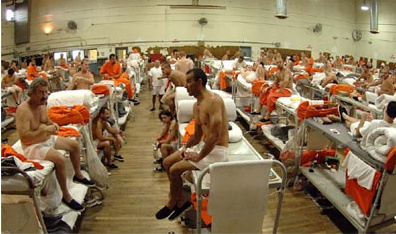
WASHINGTON — After years of complaints, protests, riots and hunger strikes as a result of unnecessary deaths and flagrant abuse/neglect due to the gross inadequacies of private prisons, the U.S. Department of Justice has finally announced they are ending their use of for-profit prisons.
The decision comes after a report from the Justice Department’s inspector general last week released a critical report concluding that privately operated facilities had more safety and security incidents than those run by the U.S. Bureau of Prisons, a department within the Justice Department. The private facilities, for example, had higher rates of assaults, both by inmates on other inmates and by inmates on staff, and had eight times as many contraband cellphones confiscated each year on average, according to the report.
The Justice Department’s inspector general released a report very critical of privately operated facilities, stating the institutions incurred more safety and security incidents than those run by the federal Bureau of Prisons. The private facilities also had higher rates of assaults, and had eight times as many contraband cellphones confiscated each year on average, according to the report.
In a memo to the department, Deputy Attorney General Sally Yates instructed officials to allow term-limited contracts with private prison companies to expire or “substantially reduce” the scope of those contracts in proportion with the decline of the federal inmate population.
Moreover, federal statistics reveal that about 73,000 or 37 percent of all inmates housed in federal prison facilities are black, despite only being 12 percent of the U.S. population.
Yates noted that about 195,000 inmates are housed in bureau or private facilities, down from a high in 2013 of 220,000. Between then and 1980, the federal prison population had increased by 800 percent, according to the Bureau of Prisons.
The government decided to use private prisons to house inmates about a decade ago, Yates said. By the time of the 2013 peak, about 30,000 prisoners were being housed in private prisons.
But with the decline, she said, the government “can better allocate our resources to ensure that inmates are in the safest facilities and receiving the best rehabilitative services – services that increase their chances of becoming contributing members of their communities when they return from prison.
“This is the first step in the process of reducing—and ultimately ending—our use of privately operated prisons. While an unexpected need may arise in the future, the goal of the Justice Department is to ensure consistency in safety, security and rehabilitation services by operating its own prison facilities.”
The announcement of the phase out comes about a week after an Office of the Inspector General report that found prisons that held government contracts were less safe and secure than those run directly by the Bureau of Prisons.
“For example, the contract prisons confiscated eight times as many contraband cell phones annually on average as the BOP institutions,” the report said. “Contract prisons also had higher rates of assaults, both by inmates on other inmates and by inmates on staff.”
Three private corporations, Corrections Corporation of America; GEO Group, Inc.; – both public corporations — and Management and Training Corporation, which remains privately owned, operate the contracted facilities, the report said. But they did not represent fiscal or security improvements for the government as expenditures rose from $562 million in 2011 to $639 million in 2014.
In recent years, disturbances in several federal contract prisons resulted in extensive property damage, bodily injury, and the death of a correctional officer,” said the report.
At least one of the companies has disputed the findings of the report however. Scott Marquardt, president of Management and Training Corporation, told the post that the comparison between BOP facilities and those that are privately run is a poor one.
“Any casual reader would come to the conclusion that contract prisons are not as safe as BOP prisons,” Marquardt said. “The conclusion is wrong and is not supported by the work done by the [Office of the Inspector General].”
But Yates’ statement concurred with the sentiments shared in the Inspector General’s report.
“The fact of the matter is that private prisons don’t compare favorably to Bureau of Prisons facilities in terms of safety or security or services, and now with the decline in the federal prison population, we have both the opportunity and the responsibility to do something about that,” Yates said.